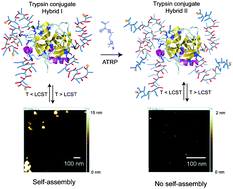Responsive hybrid block co-polymer conjugates of proteins–controlled architecture to modulate substrate specificity and solution behaviour†
Abstract
Responsive

- This article is part of the themed collection: Polymer Bioconjugates
* Corresponding authors
a
The School of Pharmacy, Boots Science Building, University of Nottingham, University Park, Nottingham, UK
E-mail:
Johannes.magnusson@nottingham.ac.uk, cameron.alexander@nottingham.ac.uk
Fax: +44 (0) 115 951 5102
Tel: +44 (0) 846 7678
b Australian Institute for Bioengineering and Nanotechnology (AIBN), Corner College and Cooper Roads (Building 75), The University of Queensland, Brisbane, Queensland, Australia
c Science and Technology Facilities Council, Rutherford Appleton Laboratory, Harwell Science and Innovation Campus, Didcot, UK
d Institut Laue-Langevin, 6 rue Jules Horowitz, GRENOBLE, France
e School of Chemistry, Cardiff University, Main Building, Park Place, Cardiff, UK
Responsive

 Please wait while we load your content...
Something went wrong. Try again?
Please wait while we load your content...
Something went wrong. Try again?
G. Yaşayan, A. O. Saeed, F. Fernández-Trillo, S. Allen, M. C. Davies, A. Jangher, A. Paul, K. J. Thurecht, S. M. King, R. Schweins, P. C. Griffiths, J. P. Magnusson and C. Alexander, Polym. Chem., 2011, 2, 1567 DOI: 10.1039/C1PY00128K
To request permission to reproduce material from this article, please go to the Copyright Clearance Center request page.
If you are an author contributing to an RSC publication, you do not need to request permission provided correct acknowledgement is given.
If you are the author of this article, you do not need to request permission to reproduce figures and diagrams provided correct acknowledgement is given. If you want to reproduce the whole article in a third-party publication (excluding your thesis/dissertation for which permission is not required) please go to the Copyright Clearance Center request page.
Read more about how to correctly acknowledge RSC content.
 Fetching data from CrossRef.
Fetching data from CrossRef.
This may take some time to load.
Loading related content
